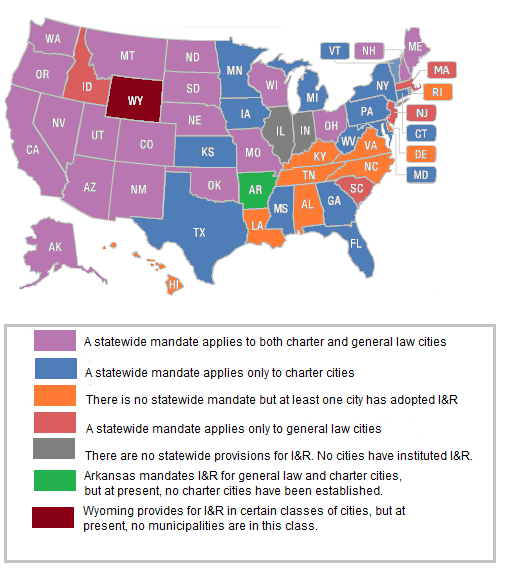Laws governing local ballot measures in Kentucky
| Ballot Law Portal |
| Laws Governing Ballot Measures |
| A guide to local ballot initiatives | |
|---|---|
 | |
Local referendum powers are granted by the Ketucky Constitution but only concerning limited subject matters. Initiative powers on the local level seem to be prohibited by state law.
This article sets out the laws governing local ballot measures in Kentucky. It explains:
- Which local units of government make the initiative process available to residents.
- How and whether local units of government, including school districts, can refer local ballot measures (such as school bond propositions) to the ballot.
Types of local government
According to a 2022 study from the U.S. Census Bureau, this state's local governments consist of 118 counties, 417 cities, towns, and villages, and 601 special districts.[1]
Cities and Counties also have the option of consolidating governments under one of the forms provided by state law. Louisville-Jefferson operates as a consolidated local government under Kentucky Revised Statute 67C. Lexington-Fayette operates as an urban county government under Kentucky Revised Statute 67A and the local charter created during the merger process.
School districts
Kentucky only allows for elections for bond issues. The Kentucky Constitution gives school districts the right to hold elections freely at any time and without any minimum notice requirement. The law also states that bond issues are limited to new construction and capital improvements. There are no restrictions on selling terms or maturity. However, Kentucky law bans referendums for the building of new athletic facilities.
In Kentucky, a school district is required to refer a ballot measure to voters when the school district votes to raise the district's tax rate to produce a revenue increase of more than 4%.[2]
Initiative process availability
An initiative process is not mentioned explicitly, but seems to be prohibited by Kentucky Revised Statute Section 83A.120 below. The process for referendum is allowed, but is restricted to the limited issues which are established in Section 60 of the Constitution below.[3]
Authority
Constitution
Rules restricting the use of direct democracy are found in:
| ||||||||
Statutes
Petitions for referenda are treated in:
| ||||||||
Initiative process features
|
| Local I&R Laws in the 50 States |
 |
| Source: Local Ballot Initiatives: How citizens change laws with clipboards, conversations, and campaigns |
Initiative process in the top 10 most populated cities
Lexington is the only local government in Kentucky with an initiative process for local ballot measures.
See law: Lexington-Fayette Charter, Art. 14
| |||||
External links
Footnotes
- ↑ U.S. Census Bureau, "2022 Census of Governments – Organization," accessed October 16, 2023
- ↑ Richmond Register, "Construction to continue at MSHS after school begins," August 14, 2009
- ↑ Ballotpedia, "Types & #s of local government by state," September 2012
- ↑ 4.0 4.1 Note: This text is quoted verbatim from the original source. Any inconsistencies are attributable to the original source.
- ↑ Kentucky Revised Statutes 83A.120
- ↑ 6.0 6.1 6.2 6.3 6.4 6.5 6.6 6.7 6.8 6.9 Annual Estimates of the Resident Population for Incorporated Places in Kentucky: April 1, 2010 to July 1, 2019
| |||||||||||||


